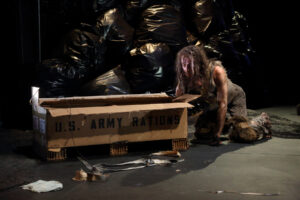
One of Opera’s Strangest Plots: David T. Little and Royce Vavrek’s ‘Dog Days’
By John VandevertThe phrase “dog days” usually refers to the humid, heavy days of summer when the weather is abrasive and too hot to really do anything. Generally temperamental and discomforting, the term comes from the “dog star” Sirius rising over the Eastern horizon during the middle part of the year. It’s a time of great change and great lethargy.
Premiered in the fall of 2012, an opera about a mysterious man dressed in a dog costume begging for food has to be one of the more obscure and out-there plots. However, dig a bit deeper and the opera’s objective becomes all too clear. Composed by David T. Little, with a libretto by Royce Vavrek, the hard-to-swallow opera “Dog Days” was heralded as an exceptional addition to the 21st-century operatic history books.
Incorporating popular music, heavy metal, plainchant, and bel cantoism in dedicated crossover pastiche, Little and Vavrek’s opera joins the ranks of operatic vanguards like 20th-century luminaries like Schoenberg, Prokofiev, Henze, Ligeti, Britten, Penderecki, and Maderna.
But, the opera is based on something. The plot was not just dreamed up but actually adapted from somewhere, a short story written 14 years earlier. In this article, we’ll explore the origins of the plot and what it’s trying to tell us.
The Original Story
The original story was written by American writer Judy Budnitz (1973-) as one short story in a collection of short stories called “Flying Leap.”
Published in 1998, the same year as operatic premieres like Jonathan Dove’s Flight, Paula Klimper’s Patience and Sarah, and Tobias Picker’s Fantastic Mr. Fox, the 23-story collection orients around dystopian end-of-the-world scenarios.
Each one of the narratives attempted to showcase the horrors and humanity of our world when faced with significant obstacles to our wellbeing. The stories take a rather crude look at the ways we change when our known social order is destabilized or challenged.
In some of them, karma comes whereas in others, surreality and strangeness takes on a more human and empathetic face. But in “Dog Days,” when faced with starvation, a family who looked at this dog-person as a friend soon turned carnal themselves.
The dog-person finds shelter on the family’s porch following the destruction of society. However, it is not just a costume the man is wearing. He has given up his humanity for the personality of a dog. Soon, the family begins to accept this dog-person and treat it as their pet. But their patience quickly turns as the threat of death approaches.
The father, who had his patience used up at the threat of starvation, shoots the man as he runs, the dog-person’s final act being to revert to his man form before death.
But What Does It Mean?
The opera’s main purpose is to explore the conception of our relationship to society, societal roles, and what happens when both are destroyed. What happens when we lose our social identity? Are we able to adopt new ones or do we have to maintain fidelity to our pre-destruction selves?
In the trailer of the opera Little notes the opera’s objective is to ask, “[w]hat it means to be human and what it means to be part of a society and how we as individuals behave to each other inside of that collective.” The dog-person had given up his identity as a human being and was no longer acting as a human being, but a dog.
Difficulty arises as the family is forced to accept this new reality or forever see the dog as a deranged human being. Do they give up on the idea of humanity? What does this mean for them? Ultimately, the family begins to see the “dog” as a food supply as all other animals have died.
The daughter begins a friendship with the dog and yet finds her starvation aesthetically attractive in her delusion. As the family starves, the father continues to act irrational. Forced to act, the family chooses a crooked and warped life over death.
What the story teaches us is obscure but generally, we must continue to live even if our reality is augmented. We must find a way and a place, even if that place is completely foreign to you. We all need a place, even if society is gone.


